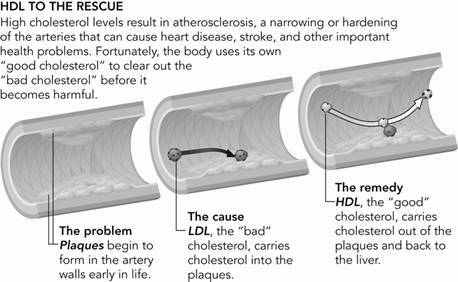When is it neccesary to talk about cholesterol?
High cholesterol is a serious health problem that affects about fifty million Americans. It’s a major risk factor for cardiovascular disease (CVD), which half of all men and a third of all women will get at some time in their lives.
While too much cholesterol can be harmful, just the right amount of it does a lot of important work in the body. But like carbohydrates in recent years, cholesterol has gotten such a bad rap that most people don’t know the good it does.
Cholesterol performs three main functions:
- It helps make the outer coating of cells.
- It makes up the bile acids that work to digest food in the intestine.
- It allows the body to make Vitamin D and hormones, like estrogen in women and testosterone in men.
There are countless other lipoproteins but in order to get a basic understanding of how cholesterol affects your body and how the food you eat affects your cholesterol levels, LDL and HDL are the ones to start with.
Cholesterol is a fat, or lipid. The two main types of lipoproteins important in a discussion on heart disease are low-density lipoproteins (LDL) and high-density lipoproteins (HDL).
Though the names sound the same, these two particles are as different as night and day.
Without cholesterol, none of these functions would take place, and without these functions, human beings wouldn’t exist.
Cholesterol is so important to the body that it makes it itself—Mother Nature doesn’t leave it up to humans to get whatever they need from diet alone. So even if you ate a completely cholesterol-free diet, your body would make the approximately 1,000 mg it needs to function properly.
Your body has the ability to regulate the amount of cholesterol in the blood, producing more when your diet doesn’t provide adequate amounts. The regulation of cholesterol synthesis is an elegant process that is tightly controlled.
There are a variety of factors that affect how the body regulates the amounts of lipids in the blood and what may cause increase in LDL levels and decrease HDL levels.
Poor eating habits
Diet that is high in saturated fat tends to elevate cholesterol. Saturated fats are found mostly in foods that come from animals. Saturated fat raises you LDL (“bad”) cholesterol level more that anything else in the diet. Eating too much saturated fat is the main reason for high levels of cholesterol and high rate of heart attacks.
Smoking
Cigarette smoking lowers HDL (“good”) cholesterol levels and is one of the six major risk factors of heart disease. It also increases the tendency for blood to clot. Once a person quits smoking, HDL cholesterol levels rises within weeks or months to levels that are equal to their nonsmoking peers.
Excess Weight
Excess weight tends to increase your LDL (“bad”) cholesterol level. If you are over weight and have high LDL-cholesterol level, losing weight may help you lower it.
Heredity
Heredity can make certain individuals more prone to high cholesterol. Genes play a role in influencing you LDL-cholesterol level. Your genes influence how high you LDL (“bad”) cholesterol is by affecting how fast LDL is made and removed from the blood.
Stress
Stress over the long term has been shown in several studies to raise blood cholesterol levels. One way that stress may do this is by affecting your habits. For example, when some people are under stress, they console themselves by eating fatty foods.
Alcohol consumption
Alcohol intake increases HDL (“good”) cholesterol but does not lower LDL (“bad”) cholesterol. But drinking too much alcohol can damage the liver and heart muscle, lead to high blood pressure, and raise triglycerides. Because of the risks, the benefit isn’t great enough to recommend drinking alcohol if you don’t do so already.
Factors which Lower Cholesterol in the Body
Good Eating Habits
Eating healthy is a vital part of lowering you cholesterol. Increasing fiber intake by as little as 3 grams per day can help lower cholesterol. Good sources include oatmeal, soy, legumes, some vegetables, and beans. A healthy diet includes minimal saturated fat. However, monounsaturated fats (olive oils) have a positive effect on cholesterol. Alcohol should also be kept to a minimum.
Exercise
Along with diet, exercising is an important part of achieving a healthy cholesterol level. Being physically active can help lower you cholesterol level, whether it involves everyday activities like cleaning or gardening or structured exercise program. Exercise sets off a series of enzymatic reactions in the body that increases HDL’s and lowers triglycerides. This will ultimately lower LDL’s (“bad”) and total cholesterol.
Weight Loss
This is actually the most significant independent contributor to cholesterol reduction. While exercise and proper diet contribute to cholesterol reduction. In most cases weight loss must occur to see an improvement. The good news is that only a five percent weight loss can alter cholesterol significantly.







